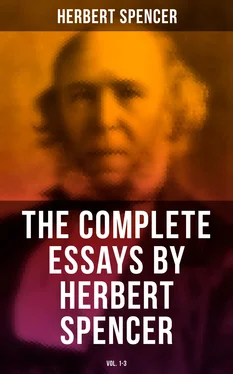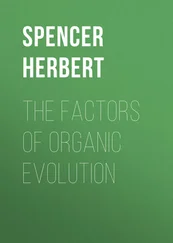Feelings, or those modes of mind in which we are occupied, not with the relations subsisting between our sentient states, but with the sentient states themselves, are divisible into four parallel sub-classes.
Presentative feelings , ordinarily called sensations, are those mental states in which, instead of regarding a corporeal impression as of this or that kind, or as located here or there, we contemplate it in itself as pleasure or pain: as when eating.
Presentative-representative feelings , embracing a great part of what we commonly call emotions, are those in which a sensation, or group of sensations, or group of sensations and ideas, arouses a vast aggregation of represented sensations; partly of individual experience, but chiefly deeper than individual experience, and, consequently, indefinite. The emotion of terror may serve as an example. Along with certain impressions made on the eyes or ears, or both, are recalled in consciousness many of the pains to which such impressions have before been the antecedents; and when the relation between such impressions and such pains has been habitual in the race, the definite ideas of such pains which individual experience has given, are accompanied by the indefinite pains that result from inherited effects of experiences—vague feelings which we may call organic representations. In an infant, crying at a strange sight or sound while yet in the nurse's arms, we see these organic representations called into existence in the shape of dim discomfort, to which individual experience has yet given no specific outlines.
Representative feelings , comprehending the ideas of the feelings above classed, when they are called up apart from the appropriate external excitements. As instances of these may be named the feelings with which the descriptive poet writes, and which are aroused in the minds of his readers.
Re-representative feelings , under which head are included those more complex sentient states that are less the direct results of external excitements than the indirect or reflex results of them. The love of property is a feeling of this kind. It is awakened not by the presence of any special object, but by ownable objects at large; and it is not from the mere presence of such object, but from a certain ideal relation to them, that it arises. As before shown (p. 253) it consists, not of the represented advantages of possessing this or that, but of the represented advantages of possession in general—is not made up of certain concrete representations, but of the abstracts of many concrete representations; and so is re-representative. The higher sentiments, as that of justice, are still more completely of this nature. Here the sentient state is compounded out of sentient states that are themselves wholly, or almost wholly, re-representative: it involves representations of those lower emotions which are produced by the possession of property, by freedom of action, etc.; and thus is re-representative in a higher degree.
This classification, here roughly indicated and capable of further expansion, will be found in harmony with the results of detailed analysis aided by development. Whether we trace mental progression through the grades of the animal kingdom, through the grades of mankind, or through the stages of individual growth; it is obvious that the advance, alike in cognitions and feelings, is, and must be, from the presentative to the more and more remotely representative. It is undeniable that intelligence ascends from those simple perceptions in which consciousness is occupied in localizing and classifying sensations, to perceptions more and more compound, to simple reasoning, to reasoning more and more complex and abstract—more and more remote from sensation. And in the evolution of feelings, there is a parallel series of steps. Simple sensations; sensations combined together; sensations combined with represented sensations; represented sensations organized into groups, in which their separate characters are very much merged; representations of these representative groups, in which the original components have become still more vague. In both cases, the progress has necessarily been from the simple and concrete to the complex and abstract; and as with the cognitions, so with the feelings, this must be the basis of classification.
The space here occupied with criticisms on Mr. Bain's work, we might have filled with exposition and eulogy, had we thought this the more important. Though we have freely pointed out what we conceive to be its defects, let it not be inferred that we question its great merits. We repeat that, as a natural history of the mind, we believe it to be the best yet produced. It is a most valuable collection of carefully-elaborated materials. Perhaps we cannot better express our sense of its worth, than by saying that, to those who hereafter give to this branch of Psychology a thoroughly scientific organization, Mr. Bain's book will be indispensable.
Table of Contents
[ First published in The Westminster Review for January, 1860.]
Sir James Macintosh got great credit for the saying, that "constitutions are not made, but grow." In our day, the most significant thing about this saying is, that it was ever thought so significant. As from the surprise displayed by a man at some familiar fact, you may judge of his general culture; so from the admiration which an age accords to a new thought, its average degree of enlightenment may be inferred. That this apophthegm of Macintosh should have been quoted and requoted as it has, shows how profound has been the ignorance of social science. A small ray of truth has seemed brilliant, as a distant rushlight looks like a star in the surrounding darkness.
Such a conception could not, indeed, fail to be startling when let fall in the midst of a system of thought to which it was utterly alien. Universally in Macintosh's day, things were explained on the hypothesis of manufacture, rather than that of growth; as indeed they are, by the majority, in our own day. It was held that the planets were severally projected round the Sun from the Creator's hand, with just the velocity required to balance the Sun's attraction. The formation of the Earth, the separation of sea from land, the production of animals, were mechanical works from which God rested as a labourer rests. Man was supposed to be moulded after a manner somewhat akin to that in which a modeller makes a clay-figure. And of course, in harmony with such ideas, societies were tacitly assumed to be arranged thus or thus by direct interposition of Providence; or by the regulations of law-makers; or by both.
Yet that societies are not artificially put together, is a truth so manifest, that it seems wonderful men should ever have overlooked it. Perhaps nothing more clearly shows the small value of historical studies, as they have been commonly pursued. You need but to look at the changes going on around, or observe social organization in its leading traits, to see that these are neither supernatural, nor are determined by the wills of individual men, as by implication the older historians teach; but are consequent on general natural causes. The one case of the division of labour suffices to prove this. It has not been by command of any ruler that some men have become manufacturers, while others have remained cultivators of the soil. In Lancashire, millions have devoted themselves to the making of cotton-fabrics; in Yorkshire, another million lives by producing woollens; and the pottery of Staffordshire, the cutlery of Sheffield, the hardware of Birmingham, severally occupy their hundreds of thousands. These are large facts in the structure of English society; but we can ascribe them neither to miracle, nor to legislation. It is not by "the hero as king," any more than by "collective wisdom," that men have been segregated into producers, wholesale distributors, and retail distributors. Our industrial organization, from its main outlines down to its minutest details, has become what it is, not simply without legislative guidance, but, to a considerable extent, in spite of legislative hindrances. It has arisen under the pressure of human wants and resulting activities. While each citizen has been pursuing his individual welfare, and none taking thought about division of labour, or conscious of the need of it, division of labour has yet been ever becoming more complete. It has been doing this slowly and silently: few having observed it until quite modern times. By steps so small, that year after year the industrial arrangements have seemed just what they were before—by changes as insensible as those through which a seed passes into a tree; society has become the complex body of mutually-dependent workers which we now see. And this economic organization, mark, is the all-essential organization. Through the combination thus spontaneously evolved, every citizen is supplied with daily necessaries; while he yields some product or aid to others. That we are severally alive to-day, we owe to the regular working of this combination during the past week; and could it be suddenly abolished, multitudes would be dead before another week ended. If these most conspicuous and vital arrangements of our social structure have arisen not by the devising of any one, but through the individual efforts of citizens to satisfy their own wants; we may be tolerably certain that the less important arrangements have similarly arisen.
Читать дальше












